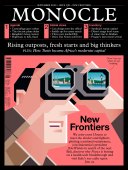
Issue 156
Monocle has its eyes on new frontiers, from health-tech breakthroughs in France to growing coffee in Sicily. Refreshed and revitalised from a summer break, we get back to work in three new media HQs and meet Dries Van Noten. Plus: the thinkers and fighters plotting Ukraine’s renaissance.
In This Issue
Oops! No content was found.
Looks like we no longer have content for the page you're on. Perhaps try a search?
Return Home

